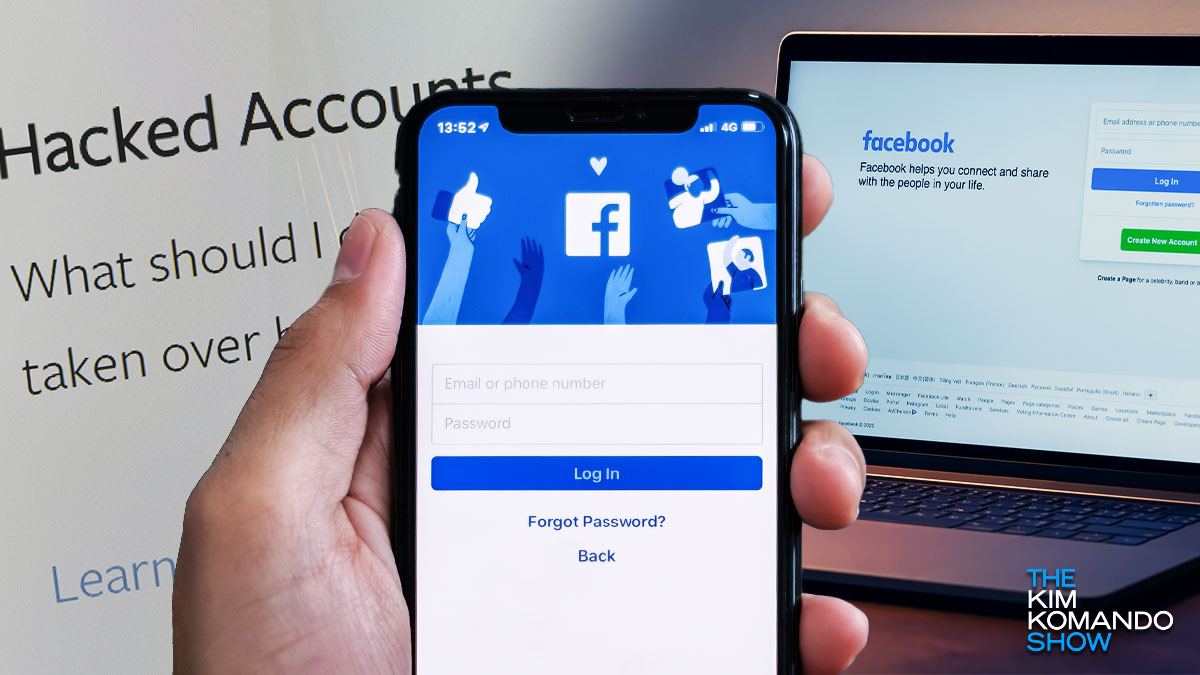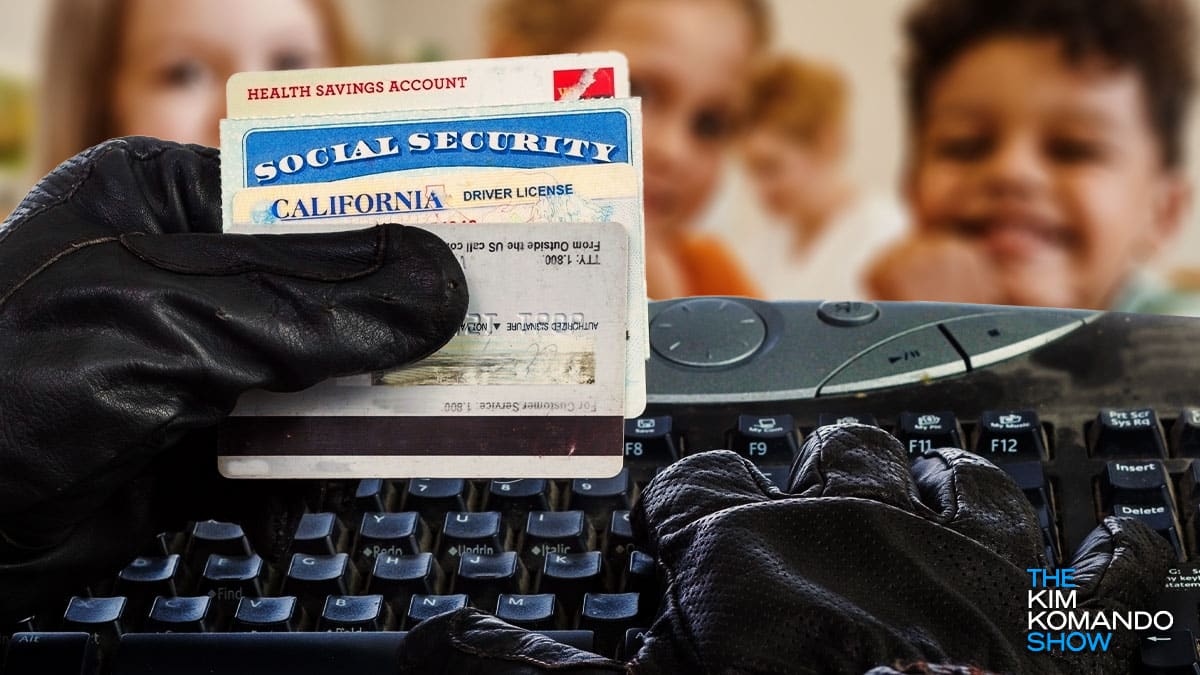Guilty as charged: A North Carolina woman left her credit card at a restaurant. Now, she’s fighting $2,000 in bogus charges after a restaurant employee shared photos of the credit card’s front and back on Facebook. The employee was trying to find her. What a dope.
Your Facebook got hacked. Now what?

Benjamin in Huntsville, Alabama, emailed me with a question I get often enough. I thought, “Ya know, I should write about this in the Current.” Someone hacked his Facebook — taking with it 16 years of treasured memories.
He’s feeling that panic I know too many of you have felt. He can’t access his account and has no idea who is logged in doing who-knows-what. I’m here to help.
🚨 Do your friends and family a favor and share this on your Facebook account. You could help someone more than you know.
You’re not alone
Facebook is a big target for hackers and scammers. Think about this: Facebook has 2.989 billion monthly active users worldwide. In other words, about 37.2% of the global population uses Facebook every month.
Once your Facebook account gets taken over, it quickly becomes a money-making machine exploiting your trusted family and friends. Here are some ways they do this:
- The hacker shares fake viral videos or malicious links designed to steal other people’s account credentials.
- They send messages to your family and friends claiming that you need money because you’re stuck in another country, suddenly diagnosed with an illness or lost your job.
- They post pictures of lost pets or children, asking people to share the post to help find them. When the post gets enough shares, they edit it to direct users to a scammy link.
- They advertise anything from pianos to puppies for sale on your account. People pay and they steal the money.
As if that’s not bad enough, you’re right in feeling violated. Your memories are sitting there for someone else to take advantage of and you’re locked out.
Your first step: Go to Facebook.com/hacked and alert Facebook that your account has been compromised. You’ll need to enter the email address or phone number associated with the account. Be sure to give every bit of info they ask for. The point here is to prove that you are you, the rightful owner of the account.
Next, contact your friends. You’ll have to do this outside of Facebook, of course. Tell them your account was hacked and ask them to do you a huge favor.
You want them to also tell Facebook your account was hacked. They need to go to your profile, click the More or three-dot menu > Find support or report. The whole idea here is the higher the number of reports that Facebook is getting, the better chance you have of getting back in.
⌛ Now it’s a waiting game. In the meantime, open a new Facebook account and lock down all your other social media accounts — strong passwords and two-factor authentication are a must!
Dating apps are shady

Let’s see. I know a 67-year-old guy, a 42-year-old woman, a 58-year-old guy, a 76-year-old woman and a 34-year-old woman … I know a lot of people who use dating apps. But my Gen Z son tells me his friends don’t use them. They just DM each other on social.
In 2000, the fastest-moving and most widespread virus in history hit 3 million PCs in just six hours. Can you guess the subject line of the infected email? Was it … A.) “URGENT,” B.) “ILOVEYOU,” C.) “MONEY4YOU” or D.) “HOT PICS”?
3 steps to protect your kids from identity theft

Last year, a Hawaii couple was convicted of living for decades under the identities of dead babies. Stories like this always disgust me, but after this long in tech, they don’t surprise me.
Crooks have no shame, folks: 2% of identity theft cases reported to the Federal Trade Commission (FTC) last year involved the personal info of Americans age 19 or younger. Many more go unreported, partly because they aren’t discovered until the victim attempts to apply for their first loan or credit card.
Your data is worth big money — and you can take it back

“Call me for a good time.” That simple message prompted more creepy calls and texts than you can believe. A woman contacted me after someone posted that message — alongside her cellphone number — on a porn site.
Mac attack: A new macOS malware called “Cuckoo” is targeting older Intel-based Macs and newer models with Apple chips. It steals passwords and takes over your system. It’s spreading via websites and apps that convert streaming music into MP3s. Stay safe: Use TotalAV to protect your tech — it’s just $19 for a year.
Keanu believe this story: A 65-year-old Colorado woman is convinced she’s been in a relationship with actor Keanu Reeves since 2022. It’s a romance scam, and she’s already in for over $5,000. Her “proof”? A fake driver’s license. She says she’ll only stop believing if Keanu himself walks through her door. If you know this woman, tell her to call me — I know Keanu.
Newest scam making the rounds: If you have automatic deposits enabled with your banking or financial institutions, cybercriminals can put money into your account. Why is that bad, you ask? They’ll immediately follow up with a sob story email asking you to send it back via a phishing link, effectively stealing your login info in the process. Don’t click any random links, and turn on 2FA for your banking logins.
Roughly 20% of people reuse passwords across multiple sites, and many don’t know the difference between a good password and bad password. You’re smarter than that — you read this newsletter! Remember, using three random words in a password is more secure than selecting random letters and numbers.
🌼 Bogus bloom: Chinese scammers are selling fake seeds on eBay for “cat’s eye dazzle.” News flash: Flowers that look like cats don’t exist. These AI-generated fakes are going for $45 and up. Older folks are the main targets. Similar phonies have been spotted on imseeds.com, gardenerstar.com, foundseed.com and dailyrosy.com.
Notorious cheating site Ashley Madison is swarming with sextortionists. Scammers get cheaters to send nudes, then they threaten to send them to the cheaters’ families and bosses unless they pay thousands. Karma’s a you-know-what.
You see a vacay at a too-good-to-be-true discount online. After booking, you get a call about an “extra charge” to finalize your trip. All fake! Protect yourself: Verify unknown companies at the BBB website, look for “https://” in the site URL (it means the website is secure), and use a credit card so you can dispute phony charges.
FBI Chinese hacker warning: The FBI warns Chinese hackers are gearing up for a massive attack against our U.S. infrastructure. Under the “Volt Typhoon” mission, these hackers have already infiltrated our telecom, energy and water sectors in an attempt to wreak havoc and induce panic. Now, they’re just waiting for “the right moment” to strike big time. Get this: For every cybersecurity pro the FBI has, there are at least 50 Chinese hackers. Have a just-in-case plan. It’s important.
It’s getting worse: In January, a water tank in Muleshow, Texas, overflowed, and now we know who was behind the cyberattack: A hacking group with ties to Russia. This will not be the last attack, and many of the 150,000 U.S. water systems are scrambling for funds and staff to beef up their defenses. Glad we store clean water at home.
Hotel data breach: Omni Hotels & Resorts was just hit by a ransomware group threatening to release the sensitive information of 3.5 million visitors. Screenshots with names, email addresses and physical addresses have been shared with DataBreaches.net. FYI, Omni operates 50 properties across the U.S., Canada and Mexico.
Ruh-roh: Roku leaked info for 576,000 accounts in their second security breach in a month. They’ve reset passwords and will notify affected users, refund any sketchy charges and make you set up 2FA. Watch out for phishing scams, phony texts and calls claiming to be Roku.
🏥 Know anyone in health care? The U.S. Department of Health and Human Services says cybercriminals are targeting medical office IT help desks. With stolen IDs, they spin tales of broken phones to trick staff into setting up multifactor authentication. Their goal? Sneak into systems, access confidential info and reroute payments straight into their pockets.
How the Pentagon tracked Putin with targeted ads
You and I aren’t the only ones being tracked by targeted ads … so are the world’s top leaders. Turns out the Pentagon’s best-kept surveillance secret isn’t pen cameras — it’s cookies.
Buckle up for the wild story of how the U.S. government used targeted ads to track down its target: Vladimir Putin.
Tax Day’s coming up

If you did your taxes, a gold star for you. And if you have not done your taxes, April 15 is a week and a half away. Sorry for the jump scare.
That’s still plenty of time to file if you haven’t yet … and plenty of time to get ripped off if you have. I’ve got your back with a last-minute checklist to avoid getting screwed by the IRS — or post-file scammers.
